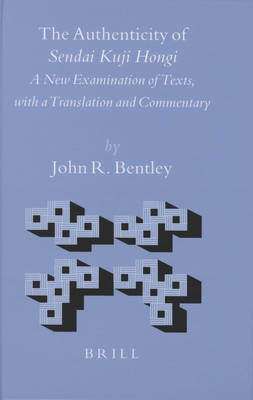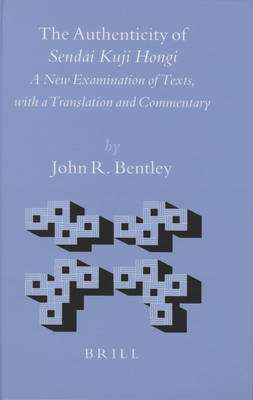
- Afhalen na 1 uur in een winkel met voorraad
- Gratis thuislevering in België vanaf € 30
- Ruim aanbod met 7 miljoen producten
- Afhalen na 1 uur in een winkel met voorraad
- Gratis thuislevering in België vanaf € 30
- Ruim aanbod met 7 miljoen producten
Zoeken
The Authenticity of Sendai Kuji Hongi
A New Examination of Texts, with a Translation and Commentary
John Bentley
€ 315,95
+ 631 punten
Omschrijving
This reexamination of Sendai kuji hongi (Kujiki) convincingly leads the reader to new conclusions on its place within the history and historiography of early Japan. While the Sendai kuji hongi is generally considered as simply derivative, drawing on Kojiki, Nihon shoki, and Kogo shūi, John Bentley's careful textual analysis demonstrates that the work has actually drawn from drafts of Kojiki and Nihon shoki, but not Kogo shūi, which has quoted from Kujiki. Thus the work can not be seen as a product of the early Heian era, but must date from the early Nara era. It therewith offers a new look not only into Japanese early Japanese historiography, but also provides a window to a variant view of the Japanese imperial lineage.
The first three chapters consist of an analysis of the text from a textual analytical and linguistic viewpoint. Sections only found in Kujiki are then examined and analyzed. With full translation of the ten books of Kujiki, and amply annotated text.
The first three chapters consist of an analysis of the text from a textual analytical and linguistic viewpoint. Sections only found in Kujiki are then examined and analyzed. With full translation of the ten books of Kujiki, and amply annotated text.
Specificaties
Betrokkenen
- Auteur(s):
- Uitgeverij:
Inhoud
- Aantal bladzijden:
- 440
- Taal:
- Engels
- Reeks:
- Reeksnummer:
- nr. 25
Eigenschappen
- Productcode (EAN):
- 9789004152250
- Verschijningsdatum:
- 29/05/2006
- Uitvoering:
- Hardcover
- Formaat:
- Genaaid
- Afmetingen:
- 163 mm x 246 mm
- Gewicht:
- 925 g

Alleen bij Standaard Boekhandel
+ 631 punten op je klantenkaart van Standaard Boekhandel
Beoordelingen
We publiceren alleen reviews die voldoen aan de voorwaarden voor reviews. Bekijk onze voorwaarden voor reviews.








